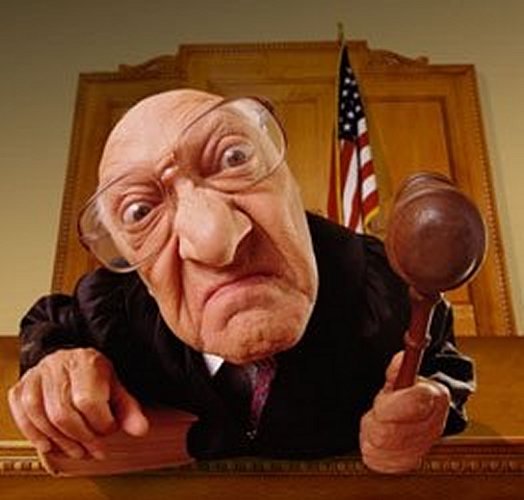
Judges Don’t Belong on the Battlefield
Recent decisions have altered the way we’re fighting in Afghanistan.
The Wall Street Journal
by David B. Rivkin, Jr., and Lee A. Casey
Earlier this year, a Washington D.C.-based federal court extended the constitutional right to habeas corpus to three foreign nationals detained by U.S. forces in Afghanistan. The case, Maqaleh v. Gates, represents yet another step in the federal judiciary’s transformation from Alexander Hamilton’s “least dangerous branch” into a fully active policy maker.
Historically, the constitutional right to habeas corpus — an ancient process permitting prisoners to challenge the legality of their confinement — was available only to individuals present in the U.S., or to American citizens held by federal authorities overseas. In a leading World War II case, Johnson v. Eisentrager (1950), the high court decided, with “bright line rules,” that habeas corpus is unavailable to foreign citizens held outside the U.S.
But last year, the high court reversed itself in Boumediene v. Bush. The court held, by a 5-4 vote, that foreign nationals detained at Guantanamo Bay, Cuba, also have a right to habeas corpus. Articulating a new, multifactor test for determining who can receive habeas corpus overseas, the court left open the possibility that aliens detained at any U.S. controlled foreign facility could sue the government for their release.
In Maqaleh the court concluded that three detainees, held at Bagram airbase in Afghanistan, but actually captured in other countries, have habeas corpus rights under the U.S. Constitution. It reasoned that permitting the president to move captured enemies from one location to another without judicial review would simply give the executive too much power.
What really is at stake is whether the president’s actions overseas — especially in military operations — are to be subject to judicial supervision. In this light, the courts have never been so bold. Although the Maqaleh court denied it, the premise of its decision is that the Constitution permits judicial involvement in all U.S. actions abroad. While this particular ruling involves habeas rights in Afghanistan, there is in fact no principled limitation on the court’s reasoning. The real test in any particular case is whether a federal judge believes the president is operating with insufficient constraints on his authority.
This new state of play has already affected U.S. military operations. American special forces, have now limited their activities in the Afghan-Pakistan border region — where al Qaeda and the Taliban are now most active — to avoid claims by enemy fighters that they were captured outside of Afghanistan, in Pakistan.
If those enemy fighters were captured outside of Afghanistan, then according to the Maqaleh decision, they are eligible for habeas relief. This provides a strategic sanctuary for Pakistan-based enemy operatives, who are now effectively immune from U.S. ground attacks.
This is obviously not the first time the courts have overstepped their proper constitutional bounds, seeking a political role for themselves. Notorious examples include the Supreme Court’s efforts to preserve slavery in Dred Scott v. Sandford (1857) and its determination to oppose federal economic regulation during President Franklin D. Roosevelt’s New Deal. In each case, the judges have eventually been strong-armed back, through the force of the public opinion and political pressures, to a more appropriate role.
The sooner this process begins, the better. A good first step would be some questions for Supreme Court nominee Sonia Sotomayor by the Senate. Senate members should determine her views on the proper role of judges in reviewing U.S. military operations overseas.
Justice Robert Jackson, writing in the Eisentrager case, explained why foreign enemies should not have access to American courts. “It would be difficult to devise more effective fettering of a field commander than to allow the very enemies he is ordered to reduce to submission to call him to account in his own civil courts and divert his efforts and attention from the military offensive abroad to the legal defensive at home.” The question is: Does Ms. Sotomayor agree?

Wild Thing’s comment…….
The Supreme Court’s disastrous Boumediene decision is giving terrorists cover in Afghanistan. Why oh why can’t everyone that is not boots on the ground Generals, our troops etc. stay out of how our troops are fighting this war.

“Why oh why can’t everyone that is not boots on the ground Generals, our troops etc. stay out of how our troops are fighting this war.”
That’s a good question. Wars are not lost by our military but rather by an inept bunch of clowns running this country who believe they know best about everything.
Great point Chrissie. I’ve two grandsons eligible to serve, under any other president I might push the issue and encourage them, I can’t. My neighbor has a 19 year old, he’s in the Navy training to be as Seabee. I want to hold a long session on reality with him when he goes on furlough next month.
The ROE’s, as someone put it into perspective are, “Rescuing Our Enemies”.
The obvious fact is nobody on the hill has been under fire nor have they had to decide life and death from outside the shelter of their judicial chambers, nor have they been amongst those in the arena making those decisions as a participant in the survival struggle.
federal court extended the constitutional right to habeas corpus to three foreign nationals detained by U.S. forces in Afghanistan.
Foreign Nationals, excuse me, what the hell are we doing over there. This is why we can’t win, not allowed to win. The enemy behind the curtain is making the rules.
What kind of bullshit is this anyway. Foreign Nationals, an illegal Mexican is a Foreign National, These three prisoners are the friggin enemy. What can’t they understand about this it is not complicated. This is a war, we kill them or they are going to kill us and not read us our Rights.
So the SCOTUS now knows military strategy and tactics in the War on Terror.
These three men are enemy terrorists dedicated to killing us. They do not qualify for ANY American rights. They do not even qualify for rights under the Geneva conventions. They should be thankful they are alive. Our men taken prisoner are executed.
Lincoln proved that judges do belong on the battle field. He put a hundred security gaurds, armed combat vets, in the Supreme Court when they took up the constitutionality of the Civil War. This establiched that judges can be entirely rational about battlefield law…when they are in the killzone.
Unforunately George Bush did not push for a set of War reforms after 9/11 and the irrational nutjobs are reasserting themselves.
and that is why MOST aemies DO NOT TAKE PRISONERS…….. Then there are no assclowns to interject themselves into that which they KNOW NOTHING ABOUT. Oooops… three attempted escapees shot and killed….PROBLEM SOLVED et al….. Fight them THERE now, or HERE later.
Bob A., your right, I sure wish they would
leave our troops alone.
Jack, I know exactly what you mean.
With Obama now things have changed so
completely, his being CIC oh my gawd,
how I wish that could take that away
from him. Make it where he can’t even
open his ugly mouth about the troops.
Mark, DITTO
“This is a war, we kill them or they are going to kill us and not read us our Rights.”
Tom, good point. I can’t even remember if
when they were debating waterboarding if
anyone in the debate brought up what the
enemy does to our soldiers when they
are captured. They should have, they
should have shown photos and video and
anything they could to make their point.
Avitar, thanks, it sure makes a huge
difference.
Alex that is so true. And we will be fighting
them here, I believe that with all I am.
And it will be because of Obama’s weak
about the enemy.